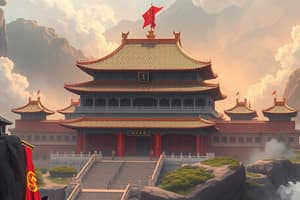Podcast
Questions and Answers
A constitution is the basis for the founding of a modern ______.
A constitution is the basis for the founding of a modern ______.
state
Sovereignty is the highest power of a country for independently handling its internal and external ______.
Sovereignty is the highest power of a country for independently handling its internal and external ______.
affairs
In China, local political institutions exercising jurisdiction do not have ______ on their own.
In China, local political institutions exercising jurisdiction do not have ______ on their own.
sovereignty
The PRC has only one constitution and one ______ to exercise state power.
The PRC has only one constitution and one ______ to exercise state power.
China is a ______ system where the Central Authorities exercise all power on behalf of the state.
China is a ______ system where the Central Authorities exercise all power on behalf of the state.
Flashcards are hidden until you start studying
Study Notes
Constitution and State Foundation
- A constitution is the foundational document for a modern state, establishing its legal framework, political structure, and fundamental rights.
- It outlines the state's legal status, acting as the origin of national laws and systems.
- Constitutions can also define the goals of state founding, including social and economic policies.
Sovereignty and Jurisdiction in China
- The PRC has a single constitution and a unified sovereignty, meaning the state has a single, indivisible power to govern.
- Sovereignty encompasses the independent and autonomous management of internal and external affairs.
- Jurisdiction is the practical application of sovereignty, granting specific powers to govern, and is inseparable from sovereignty.
- Local political institutions exercise jurisdiction but lack their own sovereignty.
China's Unitary System
- China operates under a unitary system, where the Central Authorities hold all state power.
- Power is exercised through state organs at both central and local levels.
- Local authorities are granted their power by the Central Authorities, ensuring centralized control.
- Local administrative units are subject to the leadership of the Central Authorities, eliminating any notion of independent power.
- Local governments are directly under the supervision of the Central Authorities, devoid of any residual power.
Studying That Suits You
Use AI to generate personalized quizzes and flashcards to suit your learning preferences.



